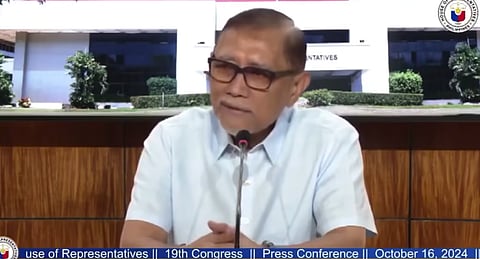
- NEWS
- the EDIT
- COMMENTARY
- BUSINESS
- LIFE
- SHOW
- ACTION
- GLOBAL GOALS
- SNAPS
- DYARYO TIRADA
- MORE

The planned parallel probe by the Senate into the bloody drug war of the Duterte administration may be “biased” given that it would be spearheaded by Senator Ronald “Bato” dela Rosa, the chief enforcer of the anti-narcotics campaign.
Manila Rep. Bienvenido Abante Jr., co-chair of the House Quad Committee, questioned Dela Rosa’s ability to be impartial given his deep involvement in the war on drugs and his close ties with former president Rodrigo Duterte.
Abante made the comments in a briefing on Wednesday, just hours after Dela Rosa announced the Senate will open a “motu proprio” (of its own volition) investigation into the war on drugs.
“He will not be fair. He became the [chief] of the Philippine National Police (PNP) during the time of the former president. So I would think he would be more biased than actually balanced in that hearing,” Abante told reporters.
Dela Rosa announced the investigation will start even if Congress is currently on break. He said he was sure his former boss Duterte will attend the Senate hearing.
Dela Rosa has been repeatedly invited to the House inquiry to shed light on the allegations that the police committed extrajudicial killings (EJK) in the drug war, but he has refused to attend, citing parliamentary courtesy between the houses of Congress.
Duterte, who also ignored previous summons, recently implied that he would face the Quad Committee on the condition that only “educated questions” would be raised.
Abante confirmed the Quadcom will invite Duterte to subsequent hearings and he will be given much leeway.
“If we’re going to invite the former president, we won’t invite too many resource persons so he could freely say his piece,” he said.
Last week, former Police Colonel Royina Garma testified before the Quadcom that the Duterte administration applied the so-called “Davao model,” where police were rewarded for killing drug suspects, on a national scale.
According to Garma, a meeting was held in May 2016, a month before Duterte took office, to discuss the creation of a task force that would implement the killings nationwide.
She said the monetary rewards for drug-related killings ranged from P20,000 to P1 million, depending on the prominence of the target.
Dela Rosa and another Duterte ally, Senator Christopher “Bong” Go, denied Garma’s allegations.
Go, whom Garma said oversaw the drug war by reporting weekly to Duterte on the number of refund requests for operational expenses, labeled Garma’s accusation as “malicious” and “unsubstantiated.”
In 2016, Duterte admitted the extrajudicial killings but contended they were not state-sponsored.
The Quadcom suspected the Duterte administration sourced the funds for the supposed cash rewards from its intelligence fund, citing fluctuations in the fund’s use in certain months.
Abante and panel co-chair, Santa Rosa Rep. Dan Fernandez, said the mega-panel will formally seek the assistance of the Anti-Money Laundering Council this week to track the cash flow tied to the drug war since the funds were funneled through the banking system.
The financial probe is viewed as a critical step in the panel’s investigation into the drug war. By determining the source of the funds and identifying the recipients, the Quadcom hopes to uncover the financial network behind the EKJs, potentially exposing the key figures who profited from the violence.
